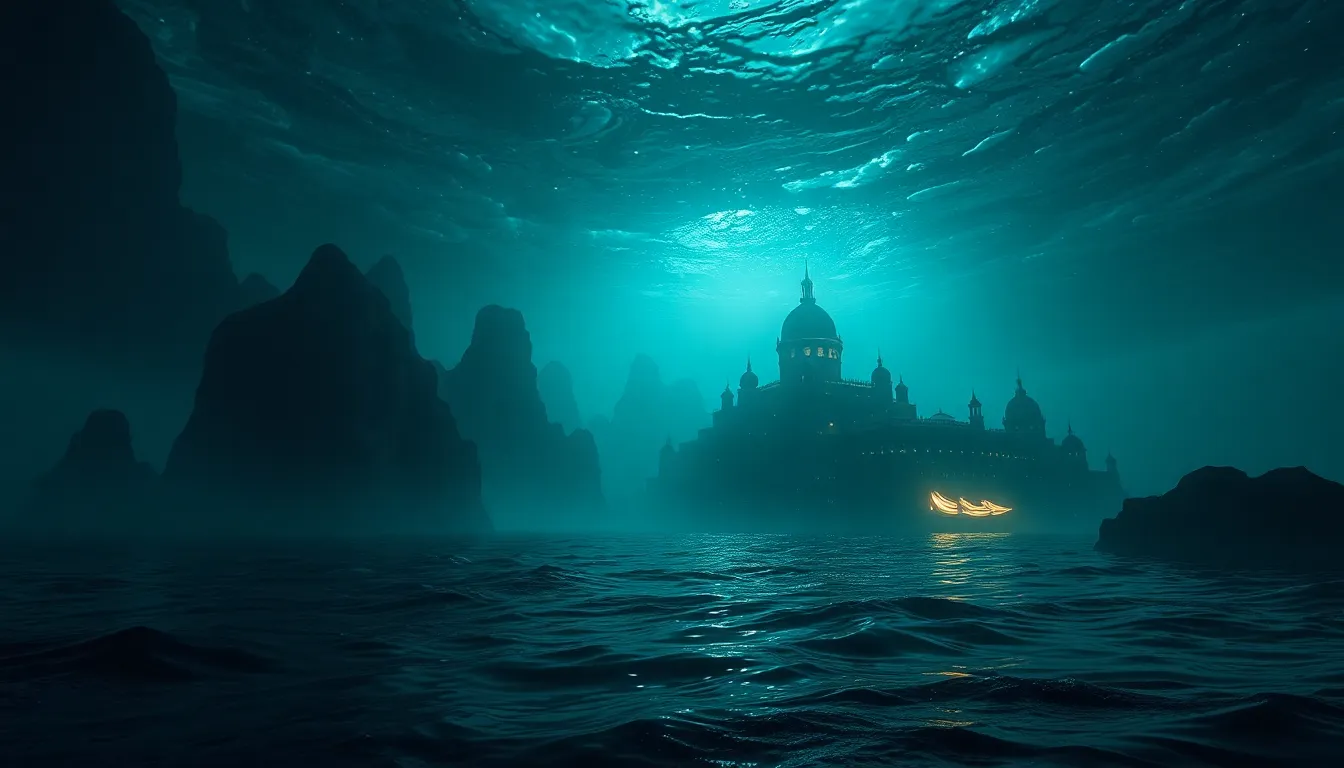The Lost City of Atlantis: Mythical Adventures Beneath the Waves
I. Introduction to Atlantis: The Allure of a Myth
The legend of Atlantis has captivated the imagination of countless generations, serving as a symbol of lost civilizations and unexplored realms beneath the waves. From its mysterious origins to its depiction in modern culture, Atlantis represents more than just a tale of a sunken city; it embodies the allure of adventure and the quest for knowledge.
This article aims to explore the myth of Atlantis, delving into its historical context, cultural impact, and the various interpretations that have emerged over the centuries. We will venture into the depths of this legendary civilization, examining its significance and the adventures it inspires.
II. The Origins of the Atlantis Legend
The story of Atlantis traces back to the works of the ancient Greek philosopher Plato. In his dialogues, Timaeus and Critias, Plato introduces Atlantis as a powerful and advanced civilization that existed around 9,000 years before his time, only to meet a tragic end due to catastrophic events.
Many scholars interpret Atlantis as a philosophical allegory rather than a historical account. Plato may have intended to convey ideas about morality, governance, and the consequences of hubris through the rise and fall of this mythical civilization. Over the centuries, various historical figures, from Renaissance thinkers to modern archaeologists, have contributed to the ongoing discussion surrounding Atlantis, each adding their own interpretations and theories.
III. The Geography of Atlantis: Where Was It?
Numerous theories have emerged regarding the possible location of Atlantis, each fueled by historical texts and archaeological discoveries. Some of the most prominent theories include:
- The Mediterranean Sea: Some researchers propose that Atlantis was located in the Mediterranean, possibly near the island of Santorini, which experienced a massive volcanic eruption around 1600 BC.
- The Caribbean and the Bermuda Triangle: Others speculate that Atlantis lies beneath the Caribbean Sea, with the Bermuda Triangle serving as a hotspot for unexplained disappearances attributed to the lost civilization.
- Antarctica and the Ice Age theories: A more controversial theory suggests that Atlantis could have been situated in Antarctica, which may have been habitable before being covered by ice during the last Ice Age.
The geographical clues embedded in the myth of Atlantis have led to a rich tapestry of theories, each adding depth to the enduring mystery of this legendary civilization.
IV. Atlantis in Ancient Texts and Archaeology
Beyond Plato’s dialogues, ancient texts from various cultures reference stories of great civilizations that have vanished beneath the waves. These texts often share common themes of divine punishment and moral decay.
Archaeological discoveries, such as those at the site of Akrotiri on Santorini, have provided tantalizing hints about advanced societies that once thrived. Artifacts and structures unearthed at such locations have sparked comparisons to the descriptions of Atlantis, raising questions about the historical accuracy of the legend.
Modern archaeology continues to play a vital role in uncovering lost civilizations, employing advanced techniques that allow researchers to explore underwater sites and ancient ruins more effectively.
V. The Symbolism of Atlantis: Lessons and Warnings
Atlantis serves as a powerful symbol of utopian ideals, representing a society that achieved remarkable advancements in technology, culture, and governance. However, the story also carries cautionary messages about the dangers of hubris and moral decay.
The tale of Atlantis warns against the consequences of overreaching ambition and the neglect of ethical responsibilities. In contemporary discussions, the symbolism of Atlantis resonates with ongoing debates about sustainability, technology, and societal values.
VI. Adventure Stories Inspired by Atlantis
The myth of Atlantis has inspired a plethora of literature, films, and interactive media, each interpreting the legend in unique ways. Notable examples include:
- Literature: Novels such as Jules Verne’s “A Journey to the Center of the Earth” feature expeditions to lost civilizations, while modern authors like Marion Zimmer Bradley have woven Atlantis into their fantasy narratives.
- Films: Movies such as Disney’s “Atlantis: The Lost Empire” and “Sahara” explore the allure of the mythical city, combining adventure with the quest for knowledge.
- Video Games: Interactive media like “God of War” and “Assassin’s Creed” incorporate elements of Atlantis, allowing players to engage with the myth in immersive ways.
VII. The Search for Atlantis: Expeditions and Discoveries
The quest to find Atlantis has spurred numerous expeditions and research projects over the years. Notable expeditions include:
- Jacques Cousteau: The renowned oceanographer conducted underwater explorations in the Mediterranean, hoping to uncover evidence of Atlantis.
- Robert Ballard: Famous for discovering the Titanic, Ballard has also led expeditions to search for lost civilizations, including Atlantis.
Advancements in technology, such as sonar mapping and remote-operated underwater vehicles, have significantly improved our ability to explore the ocean’s depths. Some discoveries, such as submerged stone structures and unusual geological formations, have sparked renewed interest in the search for Atlantis.
VIII. The Cultural Impact of Atlantis Across Civilizations
The Atlantis myth transcends cultures, with various civilizations interpreting it through their own lenses. From the ancient Greeks to the indigenous cultures of the Americas, Atlantis has become a symbol of lost knowledge and civilizations.
In art, music, and performance, Atlantis has inspired countless works, including:
- Paintings that depict the grandeur of Atlantis before its fall.
- Musicals and operas that explore themes of loss and discovery.
- Modern performances that integrate technology to create immersive experiences.
The influence of Atlantis on contemporary thought continues to shape discussions about civilization, progress, and the human condition.
IX. Debunking Myths: The Science Behind Atlantis
While the legend of Atlantis captivates the imagination, scientific explanations exist regarding its origins. Many scholars propose that the myth may have stemmed from real historical events, such as natural disasters that led to the downfall of actual civilizations, including the Minoan civilization on Crete.
Natural disasters like earthquakes and tsunamis can shape mythologies, contributing to stories of lost cities and civilizations. The debate surrounding Atlantis continues, with skeptics questioning the validity of claims and the interpretations of ancient texts.
X. Conclusion: The Enduring Legacy of Atlantis
The lost city of Atlantis remains one of the most tantalizing myths of human history. Its allure lies not only in the mystery of its existence but also in the lessons it imparts about civilization, ambition, and the consequences of our actions. As we continue to explore the depths of our oceans and the annals of history, the quest for Atlantis serves as a reminder of the adventures that await beneath the waves.




